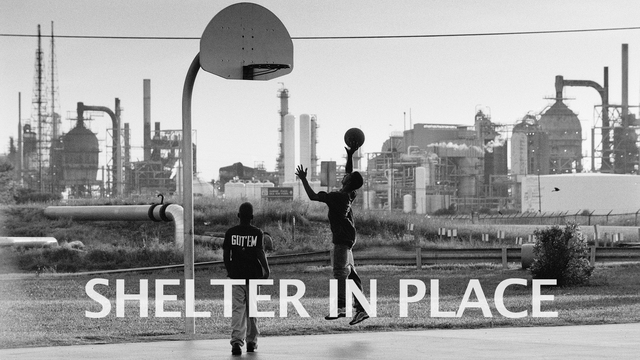The vast, sprawling complexes of oil refineries and petro-chemical plants help make the Texan economy one of the biggest in the world. But does the wealth come at too a high a price to the local community? Beautifully filmed, and burningly relevant.
In this sleepy Texan town there's always a flare on the horizon, funnelling out of the chimney of some vast, grey, oil refinery. And there's always a fear:
"Go inside a building or vehicle. Close all windows and doors. Stay off the telephone and turn on the television for more information." This is shelter in place. Announced by loudspeaker, and part of the local poor, black community's routine:
"all my kids have respiratory problems, but I can't afford to do better".
'Benzene', 'butadiene', 'hydrogen sulphide', 'nitrogen oxide'... all pollute the air around the neighbourhoods of the Texan outback:
"We know where it's coming from, we been knowing for years but we didn't know what to do about it." Each year, Texan industry is permitted to emit millions of tons of toxic pollutants into the air. Refineries are also allowed to release thousands of tons more in 'accidental' or 'unscheduled' emissions. The law defines these as 'upsets'. But toxic suits and breathing masks can't be the norm...
"They sedate you with the little cheques, and you forget for a little while", says Latasha, a mother of three. The Director of Media Relations at Valero Energy Corp. describes such pay-offs as
"standard procedure". But a powerful sense of injustice is rising: in the churches, where evangelical leaders wax lyrical about the
"devil's toxic deeds", and in the town halls, where a white lawyer preaches plainly to those who will listen...
"In a practical sense the [oil refineries] have a limitless allowance of emission." When a group of children in Port Arthur show signs of respiratory disease, Wilma Subra takes on the case. The refineries try to settle out of court and
"everything is going in our favour". Families watch Obama on the TV screen, and believe that
"change is finally here". But when it comes to trial, the case is dismissed.
"To be blunt, the people are treated as if they're expendable. They're African-American; they're poor, they're not well educated, and they don't have any political influence." The industry maintains a wall of ignorance -
"I'm not a physician. I don't know what the long-term health effects are" - but the long-standing residents have heard enough:
"this is what it's like in this country", spits Alfred, an obsessive logger of the hundreds of upsets in his area,
"the big and the powerful, they pretty much get what they want".
LEARN MORE.
WATCH MORE.
JOIN THE DISCUSSION.
British Journal of Photography.

Official Selection, Sheffield Film Festival, 2009

Winner of the Short Pitch Prize, Britdoc, 2008
"Beautifully shot, Shelter in Place is an emotionally engaging portrait of a people without a voice." - THE INTERNATIONAL FILM GUIDE
 The vast, sprawling complexes of oil refineries and petro-chemical plants help make the Texan economy one of the biggest in the world. But does the wealth come at too a high a price to the local community? Beautifully filmed, and burningly relevant.
The vast, sprawling complexes of oil refineries and petro-chemical plants help make the Texan economy one of the biggest in the world. But does the wealth come at too a high a price to the local community? Beautifully filmed, and burningly relevant.
 Official Selection, Sheffield Film Festival, 2009
Official Selection, Sheffield Film Festival, 2009
 Winner of the Short Pitch Prize, Britdoc, 2008
"Beautifully shot, Shelter in Place is an emotionally engaging portrait of a people without a voice." - THE INTERNATIONAL FILM GUIDE
Winner of the Short Pitch Prize, Britdoc, 2008
"Beautifully shot, Shelter in Place is an emotionally engaging portrait of a people without a voice." - THE INTERNATIONAL FILM GUIDE





